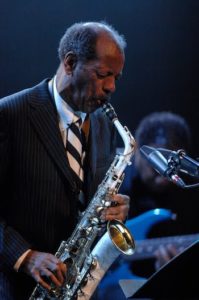
Ornette Coleman
*Ornette Coleman was born on this date in 1930. He was a Black musician and composer.
Born in Fort Worth, Texas, Coleman's father died when he was seven. His seamstress mother worked to buy Coleman his first saxophone when he was 14 years old. He taught himself sight-reading from a how-to piano book and attended I.M. Terrell High School. Coleman absorbed the instrument and began playing with a local rhythm and blues band.
Coleman knew he was not alone in his search for a sound that expressed reality as he perceived it. Los Angeles proved to be the laboratory for what came to be called free jazz. Coleman gathered a core of players who would figure primarily in his life: Don Cherry, Charlie Haden, drummers Ed Blackwell, and Billy Higgins joined the rehearsals where Coleman was honing his vocabulary.
Coleman married poet Jayne Cortez in 1954. The couple divorced in 1964. They had one son, Denardo, born in 1956, who became a notable jazz drummer. By persisting, Coleman's creativity attracted champions. Bebop bassist Red Mitchell (an old associate of Cherry's) brought the saxophone players to Contemporary Records' Lester Koenig, originally intending to sell him some of his compositions. After realizing the difficulty musicians had playing the music, Koenig asked Coleman if he could play the tunes himself. The meeting led to Coleman’s debut 1958 album, Something Else. The energy around Ornette and his players exploded during a season that Coleman played at the Five Spot Jazz Club in New York in November 1959. He began to study the trumpet and violin, expanding the scope of his composition to include string quartets, woodwind quintets, and symphonic works.
He used a Guggenheim Foundation grant to write a symphony, Skies of America. Coleman went on a journey to Morocco in 1973 to work with the Master Musicians of Jajouka in their mountain villages and visited Nigeria. Upon his return, he created a full-frontal harmolodic double whammy of drums and electric bass called Prime Time. Coleman’s 1986 collaboration with jazz-rock guitarist Pat Metheny, Song X, led to a tour and a new audience by performing and recording with the Grateful Dead. The affection and respect that Coleman and the late Jerry Garcia had for one another were captured in the sessions for 1988's Virgin Beauty (CBS/Portrait).
He formed the Harmolodic Label and began an association with Polygram France. For over ten years, Harmolodic released several works, beginning with Tone Dialing, on which a Bach prelude is rendered harmolodic ally. Coleman is the creator of a concept of music called “harmolodic,” a musical form that is equally applicable as a life philosophy. The harmolodics derive from the interaction between the players.
Breaking out of the confinement of rigid meters and conventional harmonic or structural expectations, harmolodic musicians improvise equally in what Coleman calls compositional improvisation while keeping deeply in tune with their fellow players' flow, direction, and needs. In this process, harmony becomes melody becomes harmony. Ornette describes it as “Removing the caste system from the sound.” Harmolodics equates with the freedom to be as you please, as long as you listen to others and work with them to develop your harmony.
Coleman has been rewarded with many accolades for his vision and innovation, including an induction into the American Academy of Arts and Letters, an honorary doctorate from the University of Pennsylvania, the American Music Center Letter of Distinction, and the New York State Governor Arts Award. In 1994, the MacArthur Foundation “genius” grant was awarded to Coleman. Rather than simple concerts, Coleman's performances had become big multimedia events that reflected and impacted the host town's community, lasting for several nights at a significant location.
Lincoln Center provided the backdrop for Civilization 1997, a four-night event at Avery Fisher Hall. It began with two nights of Kurt Masur conducting the New York Philharmonic with Prime Time. Perhaps the most awaited aspect of all four nights was the first New York appearance in two decades of the Original Quartet, performing all-new material. Coleman, a metaphysician, philosopher, and eternal student, baffles categorization. Coleman once said, “Most people think of me only as a saxophonist and a jazz artist, but I want to be considered a composer who could cross all the borders.”
In 2007, Coleman was honored with a Grammy Award for lifetime achievement in recognition of this legacy. In 2009, Ornette Coleman received the Miles Davis Award, a recognition from the Festival International de Jazz de Montréal to musicians who have contributed to continuing the jazz tradition. In 2010, he was awarded an honorary doctorate in Music from the University of Michigan for his musical contributions. Jazz pianist Joanne Brackeen (who had only briefly studied music as a child) stated in an interview with Marian McPartland that Coleman had been mentoring her and giving her semi-formal music lessons in recent years. Coleman continued to push himself into unusual playing situations, often with much younger musicians or musicians from radically different musical cultures.
While not ubiquitous, an increasing number of his compositions have become minor jazz standards, including "Lonely Woman," "Peace," "Turnaround," "When Will the Blues Leave?", "The Blessing," "Law Years," "What Reason Could I Give," and "I've Waited All My Life." He has influenced virtually every saxophonist of a modern disposition and nearly every such jazz musician of the generation that followed him.
His songs have proven endlessly malleable: pianists such as Paul Bley and Paul Plimley have managed to turn them to their purposes; John Zorn recorded Spy vs. Spy (1989), an album of extremely loud, fast, and abrupt versions of Coleman's songs. Ornette Coleman died of a cardiac arrest at 85 in New York City on June 11, 2015.
A Century of Jazz by Roy Carr
Da Capo Press, New York
Copyright 1997
ISBN 0-306-80778-5